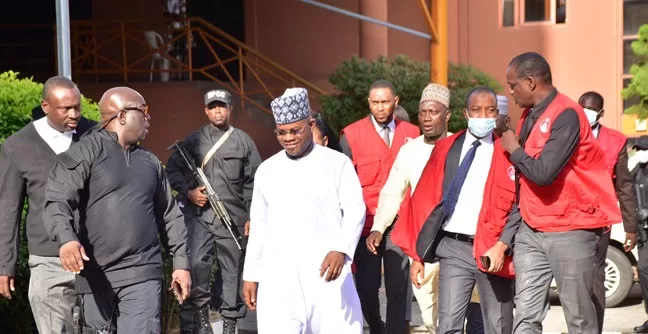The arraignment of former Kogi State Governor Yahaya Bello has been postponed because his attorneys were not informed about today’s proceedings and are therefore not present at the Federal High Court in Abuja.
Justice Emeka Nwite held on Friday that the interest of justice would be served if the EFCC’s application for the abridgement of time is served on Bello’s legal team, allowing them to be in court and respond.
The EFCC had earlier applied to arraign Bello in his absence before Justice Emeka Nwite of the Federal High Court sitting in Abuja.
The judge had fixed January 2025 for a ruling on the EFCC’s application, but the anti-graft agency later filed an application for Bello to be arraigned at an earlier date.
MOST READ ARTICLES
Bello and others were accused of conspiring in February 2016 to convert N80,246,470,088.88, allegedly obtained through a criminal breach of trust, violating Section 18(a) and punishable under Section 15(3) of the Money Laundering (Prohibition) Act, 2011, as amended.
Today’s court hearing was the fifth in a series of proceedings, as the former governor has been absent from the previous four due to ongoing legal challenges filed by his lawyers in higher courts.
EFCC counsel Kemi Pinheiro, SAN, had urged Justice Emeka Nwite to approve the arraignment of Bello in absentia.
“My first application is to formally enter a plea of not guilty on behalf of the defendant, even in his absence. The second point is, notwithstanding his physical absence, this is in full compliance with Section 276 of the Administration of Criminal Justice Act.
“Flowing from that entry, my lord, it is a humble request that we call the first witness,” he had said.
Pinheiro had urged the court to hold that the defendant has waived his right to insist that he cannot be arraigned in absentia.
Opposing the application at the time, Michael Adoyi, counsel for Bello, disagreed with the EFCC’s line of argument. He added that a subsisting order of the court had barred parties in the suit from making fresh applications.
At today’s proceedings, Pinheiro urged the court to read the charge so that Bello (who was brought in by EFCC operatives) could take his plea, citing a subsisting bench warrant.
Justice Nwite responded that he had adjourned the matter to January 2025, for a ruling on the EFCC’s application for trial in absentia and/or arraignment.
He also observed that the EFCC had filed for the abridgement (shortening) of time and Bello’s lawyers are to be notified.
He said that the EFCC’s reliance on a bench warrant cannot take the place of arraigning Bello when his counsel is not aware.
He was of the view that the interest of justice would be served if processes is served on the defendant’s counsel, allowing them to respond.
Pinheiro then applied for the court to rule that the defendant be remanded in EFCC custody.
Responding, the judge ruled that Bello’s lawyer(who was not in court) should be put on notice regarding the December 13, 2024, sitting slated for the hearing of the application for the abridgement of time and possible arraignment.
He ordered that the defendant be remanded in EFCC custody pending the hearing of the application.
